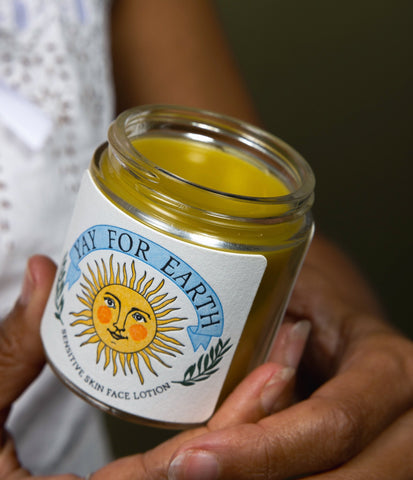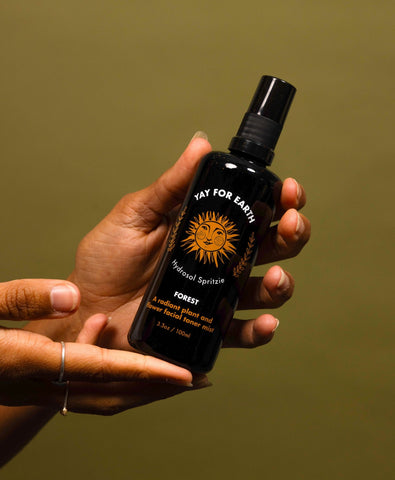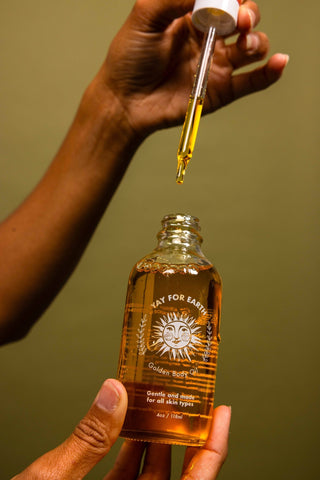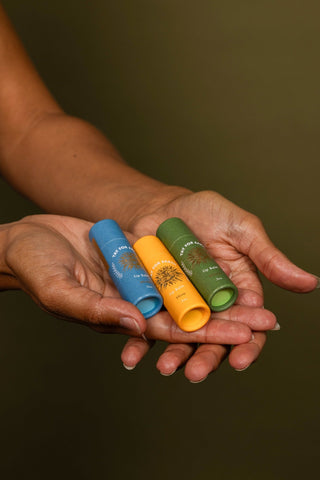If you've been down the eczema rabbit hole, you know the drill: promises of "gentle relief" from products packed with ingredients you can't pronounce, followed by more irritation than comfort. Your skin is already staging a daily rebellion, and the last thing it needs is a chemistry experiment disguised as skincare.
The thing about eczema is that it makes your skin incredibly smart about what it will and won't tolerate. While this pickiness can be frustrating when you're desperately seeking relief, it's actually your skin's way of protecting itself from further damage. Maybe it's time to listen to what it's been trying to tell you all along: less synthetic interference, more natural support.
Organic eczema lotion works with your compromised skin barrier instead of against it. When your skin is in chronic inflammation mode, earth-connected ingredients can provide relief without triggering additional flare-ups.
Understanding Your Eczema: What's Really Happening Beneath the Surface
Before we dive into solutions, let's understand what you're actually dealing with. Eczema isn't just "sensitive skin having a bad day" – it's a complex condition involving your immune system, skin barrier function, and environmental factors all having an ongoing conversation that sometimes gets pretty heated.
The Skin Barrier Breakdown
Think of your skin barrier as your body's most dedicated security team, working 24/7 to keep moisture in and irritants out. In healthy skin, this barrier consists of skin cells held together by lipids (natural fats) that form a protective seal. But with eczema, this security system has serious gaps.
Your compromised barrier allows moisture to escape while letting irritants sneak through. This creates a frustrating cycle: dry skin becomes more sensitive, sensitive skin becomes more inflamed, and inflamed skin heals poorly, perpetuating the dysfunction.
The Inflammation Cascade
Eczema involves an overactive immune response where your body treats harmless substances like dangerous invaders. This triggers inflammatory chemicals that cause the redness, swelling, and itching you experience daily.
Inflammation damages the skin barrier further, creating more entry points for irritants and allergens. It's a security breach that weakens your defenses even more.
The Itch-Scratch Cycle
Scratching feels satisfying in the moment but makes everything worse. It damages already compromised skin, introduces bacteria from fingernails, and triggers more inflammatory chemicals. Your nervous system develops "itch memory," where previously scratched areas become hypersensitive.
Microbiome Disruption
Eczema dramatically alters your skin's microbiome – the community of beneficial bacteria living on your skin's surface. Harmful bacteria often overgrow while beneficial bacteria decline, contributing to ongoing inflammation and increased infection susceptibility.

Why Going Organic Makes Scientific Sense for Eczema
The decision to choose organic eczema lotion isn't just about following natural trends – it's about giving your already overwhelmed skin the gentlest possible support while it works to heal itself.
Chemical Sensitivity and Compromised Barriers
When your skin barrier is compromised, substances that wouldn't normally penetrate can slip through and trigger reactions. Synthetic fragrances, preservatives, and chemical additives in conventional skincare can penetrate barrier gaps and cause additional inflammation.
People with eczema have significantly higher rates of contact allergies to common skincare chemicals. Formaldehyde-releasing preservatives, synthetic fragrances, and certain colorants are particularly problematic.
The Pesticide Problem
Conventional farming residues can act as additional irritants for hypersensitive skin. Organic certification ensures ingredients are grown without synthetic pesticides, reducing the chemical load on sensitive skin.
Processing That Preserves Benefits
Organic ingredients use gentler processing methods that preserve beneficial compounds. Cold-pressing oils and avoiding harsh chemical solvents maintain the natural anti-inflammatory properties that make these ingredients effective for eczema relief.
SHOP THE BEST ORGANIC ECZEMA LOTION

Star Organic Ingredients That Actually Soothe Eczema
Not all organic ingredients are created equal when it comes to eczema relief. The most effective natural solutions target multiple aspects of the condition: inflammation, barrier repair, moisture retention, and microbiome support.
Organic Shea Butter: The Anti-Inflammatory Powerhouse
Raw, unprocessed shea butter contains natural anti-inflammatory compounds called cinnamic acid esters that calm eczema flares without irritation. Rich in vitamins A and E, it supports skin healing while providing antioxidant protection. The high concentration of fatty acids helps repair barrier function while delivering immediate moisture relief.
Organic Olive Oil: Ancient Wisdom, Modern Science
Cold-pressed organic olive oil contains squalene, a compound naturally present in healthy human skin but often deficient in eczema-prone skin. The antioxidants, particularly vitamin E and polyphenols, protect against oxidative stress that perpetuates inflammation. Natural antimicrobial properties help rebalance the skin microbiome without disrupting beneficial bacteria.
Organic Pomegranate Seed Oil: The Regenerative Wonder
This precious oil contains punicic acid, a rare omega-5 fatty acid that supports natural collagen production and has powerful anti-inflammatory effects. The high antioxidant content helps break the inflammation cycle, while nourishing fatty acids support long-term barrier health.
Natural Beeswax: The Protective Barrier
Pure, locally-sourced beeswax creates a breathable protective barrier that prevents moisture loss without clogging pores. Natural antimicrobial properties help prevent secondary infections while anti-inflammatory compounds soothe irritated skin without causing sensitivity reactions.
Colloidal Oatmeal: The Inflammation Soother
Finely ground organic oats contain avenanthramides with clinically proven anti-inflammatory and anti-itch properties. Beta-glucans help repair barrier function while gentle cleansing properties remove irritants without stripping protective oils.
What to Avoid: Hidden Irritants in "Gentle" Products
Even products marketed for sensitive or eczema-prone skin can contain ingredients that worsen your condition. Learning to identify these hidden triggers helps you make better choices for your skin's health.
Synthetic Fragrances: The Invisible Irritants
Fragrance is one of the most common allergens for people with eczema, often hidden under terms like "fragrance" or "parfum." Even "unscented" products may contain masking fragrances. These can penetrate compromised barriers and trigger delayed reactions.
Preservative Pitfalls
Many synthetic preservatives are known irritants for eczema-prone skin. Formaldehyde-releasing preservatives like DMDM hydantoin are particularly problematic, as are some parabens in sensitive individuals.
Alcohol and Essential Oil Overload
Denatured alcohol strips away protective oils and causes immediate stinging. Many essential oils, while natural, are potent allergens – citrus oils, tea tree, and lavender are common culprits even in organic formulations.
Application Techniques That Maximize Relief
Having the right organic eczema lotion is only half the battle – how you apply it can dramatically affect its effectiveness and your skin's response.
Timing and Application Method
Apply organic eczema lotion within three minutes of bathing while the skin is still damp. This "wet skin moisturizing" technique traps water and maximizes hydration. Use gentle patting motions rather than rubbing – damaged skin is easily irritated by friction.
Warm the product between your palms before application. For active flares, try the "pat and press" method: gently pat lotion onto affected areas, then press lightly with your palm.
Frequency Guidelines
With eczema, frequent application of smaller amounts usually works better than infrequent heavy applications. Start with twice daily, but listen to your skin – some people need 3-4 applications daily during flares.
Nighttime Intensive Care
Nighttime is when skin does its most important repair work. Apply a slightly thicker layer before bed, focusing on problematic areas. Consider the "soak and seal" method: bath or shower, gently pat dry, then immediately apply lotion to damp skin.
Creating an Eczema-Friendly Daily Routine
Managing eczema successfully requires more than just choosing the right lotion – it's about creating a gentle, consistent routine that supports your skin's healing processes throughout the day.
Morning Protection Routine
Start with lukewarm water rather than hot, which strips protective oils. Many people with eczema find plain water or a soft, damp cloth sufficient for morning cleansing. Apply organic eczema lotion to slightly damp skin, then follow with zinc oxide or titanium dioxide-based sunscreen if heading outdoors.
Evening Restoration Ritual
Evening routine is crucial because skin does its most important repair work overnight. After a lukewarm shower with minimal cleansing, pat skin gently with a soft towel, leaving it damp, then immediately apply your organic lotion.
The Power of Consistency
Eczema-prone skin thrives on consistency. Using lotion at the same times daily helps maintain optimal hydration and barrier function. Skipping applications, even when skin looks fine, can lead to barrier breakdown and increased flare risk.
Understanding Different Types of Eczema
Atopic Dermatitis: The Classic Eczema
The itchy, inflamed patches that often start in childhood and persist into adulthood. Typically affects the face, hands, feet, and flexural areas like elbow and knee creases. Organic lotions with strong anti-inflammatory properties work best – look for formulations containing shea butter and pomegranate seed oil.
Contact Dermatitis: The Reaction Response
Develops when skin contacts an irritant or allergen. Can be acute or chronic. Organic eczema lotions excel here because they eliminate most common contact allergens found in conventional products.
Dyshidrotic Eczema: The Stubborn Vesicles
Small, itchy blisters on hands and feet. Penetrating organic oils combined with protective barriers work best. Pomegranate seed oil's smaller molecular structure helps penetrate thick skin, while beeswax provides lasting protection.
Seborrheic Dermatitis: The Oily Eczema
Affects oily areas like the scalp, face, and chest. Involves yeast overgrowth and appears as scaly, yellowish patches. Organic formulations with natural antimicrobial properties help rebalance the skin microbiome.

Yay for Earth: The Beautiful Science of Minimalism in Eczema Care
When your skin is in constant rebellion, the last thing it needs is a 20-ingredient formulation where any one component could be the next trigger. Complex formulations exponentially increase reaction likelihood for eczema-prone skin. Each additional ingredient represents a potential trigger, and unexpected interactions between ingredients can create sensitivities that wouldn't exist with individual components.
This is where thoughtful minimalism becomes powerful medicine.
Yay for Earth's Sensitive Skin Face Lotion exemplifies this "less is infinitely more" philosophy. Their beloved formulation combines just four powerfully synergistic organic ingredients:
- Organic olive oil from regenerative California farms provides antioxidant protection through vitamin E and polyphenols, helping break the inflammation cycle that perpetuates eczema flares
- Local beeswax from beekeeper Beth creates a breathable protective barrier that prevents moisture loss while allowing skin to function naturally—and its natural seasonal variation proves its authenticity
- Organic shea butter delivers the anti-inflammatory compounds (cinnamic acid esters) that calm angry, reactive skin without triggering additional sensitivity
- Organic pomegranate seed oil supports regenerative healing with rare omega-5 fatty acids that help rebuild compromised barrier function over time
This isn't just ingredient minimalism—it's strategic formulation intelligence. Each component was chosen to address a specific aspect of eczema: inflammation, barrier repair, moisture retention, and protection. Together, they create synergistic effects that exceed what any single ingredient could provide.
The "no fillers—just nutrients" philosophy means every molecule serves a purpose for your compromised skin. No synthetic fragrances to trigger contact dermatitis. No formaldehyde-releasing preservatives penetrating barrier gaps. No chemical processing residues causing mysterious reactions. Just four pure, organic ingredients working harmoniously with your skin's natural healing processes.
At $32 for a 1-ounce jar, it initially seems like a significant investment. But consider this: the nutrient-dense concentration means you need only a pea-sized amount for your face, making it last 2-3 months for most people. That's roughly $0.35 per application—less than most people spend on their daily coffee, and infinitely more valuable for your skin's long-term health.
More importantly, when your eczema lotion actually works, you spend less on emergency flare treatments, fewer doctor visits, and countless hours not spent researching your next hopeful solution. The real value isn't in the price per ounce—it's in the freedom from constant skin distress.
SHOP THE BEST ORGANIC ECZEMA LOTION
Environmental Factors and Holistic Eczema Management
Climate and Indoor Environment
Low humidity from winter heating or air conditioning rapidly dehydrates eczema-prone skin. Maintaining 30-50% humidity with a humidifier significantly reduces constant moisturizer reapplication.
Fabric and Lifestyle Choices
Natural, breathable fabrics like organic cotton allow air circulation while reducing friction. Use fragrance-free detergents and avoid fabric softeners.
Stress and Sleep Connections
Stress weakens immune function and increases inflammation. Poor sleep creates a vicious cycle – itching disrupts rest while sleep deprivation worsens inflammation. Consistent moisturizing before bed supports both rest and skin repair.
Seasonal Adaptations for Year-Round Relief
Winter Challenges
Cold, dry air and indoor heating create perfect conditions for eczema flares. You may need to apply organic eczema lotion 3-4 times daily for severely affected areas.
Summer Considerations
Heat and humidity can trigger flares through increased sweating. Lighter, more frequent applications often work better than thick layers.
Year-Round Consistency
Consistent use of organic eczema lotion helps maintain optimal barrier function and reduces flare frequency.
Building Long-Term Skin Resilience
Understanding Your Patterns
Keep a simple journal noting flare triggers and effective treatments. This helps you predict and prevent flares rather than just reacting to them.
Prevention Over Treatment
As your skin stabilizes with consistent organic care, focus shifts to preventing new flares. Maintain moisturizing routines even when skin looks good.
Advanced Application Strategies for Stubborn Areas
Hand Eczema Intensive Care
Apply organic lotion immediately after each hand washing. The "glove treatment" provides intensive overnight care: apply generous organic eczema lotion to clean hands, then wear cotton gloves overnight.
Delicate Management for Facial Eczema
Use lighter pressure when applying organic lotion to facial areas. For eyelid eczema, use minimal amounts and apply with your ring finger, which naturally uses the lightest pressure.
The Role of pH in Organic Eczema Care
Healthy skin maintains a slightly acidic pH around 5.5, creating an environment where beneficial bacteria thrive while harmful microorganisms struggle. Eczema-prone skin often has disrupted pH balance, trending toward alkaline levels that compromise barrier function.
Many organic ingredients naturally support your skin's optimal pH rather than disrupting it. Raw, unprocessed organic ingredients often contain natural acids and antioxidants that help restore proper pH balance over time, which is why organic eczema lotions often provide cumulative benefits that improve with consistent use.
Frequently Asked Questions
Is organic eczema lotion really more effective than prescription treatments?
Organic eczema lotion and prescription treatments serve different purposes and aren't necessarily competing approaches. Prescription medications like topical steroids can quickly control severe inflammation during flares, while organic lotions provide gentle, daily maintenance that supports long-term skin health. Many people find the best results come from using organic lotions for daily care and prescription treatments for acute flares when needed. Always consult with your healthcare provider about the best approach for your specific situation.
How long does it take to see improvements when switching to organic eczema lotion?
Most people notice immediate improvements in skin comfort and moisture levels within the first few days of using a well-formulated organic eczema lotion. More significant improvements in barrier function and reduced flare frequency typically take 4-8 weeks of consistent use. Your skin needs time to repair damage and rebuild healthy barrier function, so patience and consistency are key to seeing lasting results.
Can children and babies safely use organic eczema lotion?
High-quality organic eczema lotions with minimal, pure ingredients are generally very safe for children and babies. In fact, the gentle nature of organic formulations often makes them ideal for young, sensitive skin. However, always patch test new products on a small area first, and consult with your pediatrician before introducing new skincare products, especially for infants under six months or children with severe eczema.
What should I do if my eczema gets worse after starting an organic lotion?
If your eczema worsens after starting any new product, discontinue use immediately and return to your previous routine. Even natural ingredients can trigger reactions in sensitive individuals. Wait for your skin to return to baseline, then consider patch testing the product on a small area to identify if it's truly the cause. If you suspect an allergic reaction, consult with your healthcare provider or dermatologist.
Are there any organic ingredients I should specifically avoid with eczema?
While organic ingredients are generally gentler than synthetic alternatives, some can still trigger reactions in sensitive individuals. Common organic allergens include certain essential oils (especially citrus, tea tree, and lavender), nuts and nut oils (if you have food allergies), and some botanical extracts. The safest approach is to choose products with minimal ingredient lists and avoid anything you know triggers your eczema.
How do I know if an "organic" eczema lotion is truly organic and effective?
Check ingredient lists carefully – truly organic products will list specific organic ingredients rather than vague terms. Research the company's sourcing practices and manufacturing methods. At Yay for Earth, we are transparent about our farmers, production methods, and ingredient sourcing typically offer higher quality, more effective products.
Can I use organic eczema lotion on my face if I have facial eczema?
Many organic eczema lotions are gentle enough for facial use, but always patch test first since facial skin is more sensitive than body skin. Look for products specifically formulated for sensitive or facial skin. Yay for Earth's Sensitive Skin Face Lotion is specifically designed for facial use and has been used successfully by many people with facial eczema, but individual responses vary.
Is it worth paying more for premium organic eczema lotion?
Quality organic eczema lotions often cost more than conventional alternatives, but the investment frequently pays off through better results and reduced need for additional treatments. High-quality organic ingredients, careful sourcing, and small-batch production do cost more to produce. Consider the cost per use rather than just the upfront price – effective products often require smaller amounts and provide longer-lasting relief, making them more economical in the long run.
Disclaimer
The information provided in this article is for educational and informational purposes only and is not intended as medical advice. Eczema is a complex medical condition that can vary significantly between individuals, and treatment approaches should always be discussed with qualified healthcare providers.
While organic eczema lotions can provide effective relief for many people, they are not a cure for eczema and may not be suitable for all individuals or all types of eczema. Some people may require prescription medications or other medical treatments in addition to or instead of topical organic products.
Always perform patch tests before using new skincare products, especially if you have a history of allergic reactions or very sensitive skin. Discontinue use immediately if you experience increased irritation, redness, or any signs of allergic reaction. If your eczema symptoms worsen or do not improve with organic treatments, consult with a dermatologist or healthcare provider.
This article does not replace professional medical advice, diagnosis, or treatment. If you have concerns about your eczema or other skin conditions, please consult with qualified healthcare professionals who can provide personalized recommendations based on your specific situation and medical history.





